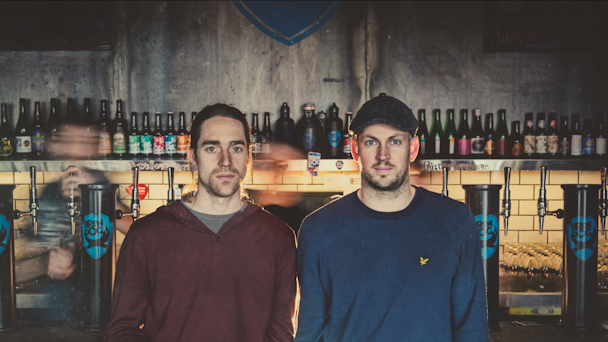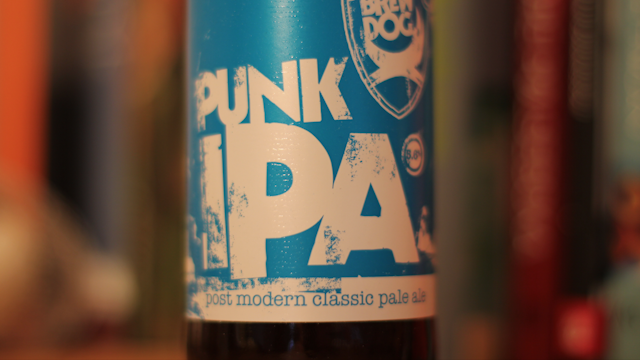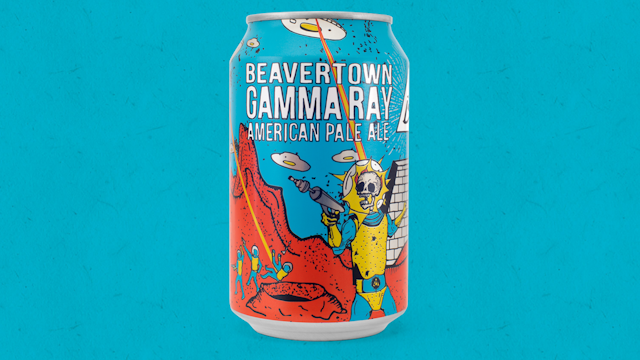
Advertisement

BrewDog / BrewDog
A gift for self-promotion has propelled Brewdog from a garage brand to the UK's fastest-growing food and drinks company with a £1bn valuation. But having sold a 22% stake to a US investor, can Brewdog hang on to the 'punk' image that has taken it this far?
One day in 2009, an outraged member of the public posted a letter to Britain’s drinks industry watchdog, the Portman Group, complaining about Brewdog and its 18.2% Tokyo imperial stout. It was irresponsible of the Scottish brewer, the writer raged, to promote a beer that strong. After a few weeks of solemn investigation, the Portman Group returned with its ruling: Tokyo was banned from bars, clubs and shops. Satisfied he’d got the outcome he wanted, the complainant decided to reveal himself. His name was James Watt, and when not writing angry letters about Brewdog, he was running Brewdog.
Getting their own beer banned to generate publicity is one of the many ingenious or – as some would have it – infuriating marketing stunts Brewdog’s founders Watt and schoolfriend Martin Dickie have pulled since starting their self-styled ‘punk’ brewery in an Aberdeenshire garage in 2007. Others have included serving the world’s strongest beer in the bodies of dead squirrels, enlisting a dwarf to petition parliament for the introduction of a two-thirds pint glass and creating a pale ale laced with steroids to help Olympians “relax before a big event and at the same time increase their chances of winning”.
Brewdog has forged its radical reputation by portraying itself as the antithesis of Britain’s beer establishment. As well as taking aim at “monolithic breweries” and their “stack ‘em high sell ‘em cheap” lagers at every opportunity, it has also jabbed away at the decades-old Campaign for Real Ale (“archaic”), the Advertising Standards Authority (“those motherfuckers have no jurisdiction over us”) and ever-willing punchbag the Portman Group (“we are sorry for never giving a shit about anything the Portman Group has to say”).
Being so combative has won Brewdog no shortage of enemies, but it has also endeared it to an army of fans who have greater reason to care about its fortunes than most other brands. That’s because some 50,000 of them have a stake in the company through its Equity for Punks crowdfunding scheme, taking at least two shares at £47.50 each in return for discounts on beers and a seat at its annual general meeting (or ‘Annual General Mayhem’, in Brewdog parlance). At its last AGM, which bore as much resemblance to a rock gig as a corporate convention, they had a front row seat as Watt and Dickie announced they’d sold a 22% stake to US investment firm TSG.

The £213m deal values Brewdog at £1bn, pockets Watt and Dickie a bumper £100m windfall and means those who bought into Equity for Punks before its first fundraising round closed in 2010 now stand to see a 2,765% rise in the value of their investment. But at what cost to the brand?
Given that Watt once likened raising institutional funds to “selling your soul to the devil”, doesn’t taking corporate cash undermine Brewdog’s guiding principles?
Scott Taylor, a reader at the University of Birmingham, makes exactly that argument in a blog post headlined “Punked? How an upstart brewing company sold up and sold out”. In his strident essay, Taylor accuses Brewdog of embodying the very characteristics that it talks so much of loathing. “Want to be a multimillionaire? Start a ‘rebel business’, generate brand controversy – and then sell it to the capitalists you appeared to despise,” he writes. “That’s one way to do it.”
Watt, however, has repeatedly rejected the suggestion that the deal amounts to selling out. “It’s not a sell-out,” he told Sky News. “If it was, I’d be away sitting on a beach somewhere as opposed to working as hard as I can for the next five or 10 years to make sure this business fulfils its potential.”
What is indisputable is that the carefully cultivated outsider status that Brewdog trades on doesn’t quite paint the full picture about the business’s standing today. Brewdog is already the fastest-growing food and drinks producer in Britain, and the country’s fastest-growing bar and restaurant operator with 30 bars across the UK and a further 15 scattered across the world in locations as far-flung as Tokyo, Rome and Sao Paulo. Its flagship product, Punk IPA, is the biggest-selling craft beer in the UK and Scandinavia. And having already grown to more than 500 staff, the company is now embarking on ambitious expansion plans in Asia and the US, where it is currently building a brewery in Columbus, Ohio.
In short: the anarchists have gone mainstream.
“They often tell the story about how they were brewing in their garage or whatever and I even fell for it once, which I’m still bitter about,” laughs Will Hawkes, a food and drinks writer and author of Craft Beer London.
“Martin was working for Thornbridge, the most forward-looking, innovative brewer in Britain before Brewdog came along. And the thing about James is, when you meet him, he couldn’t be less punk. He’s not a punk personality. He’s quite thoughtful, he’s very intense. He’s an excellent businessman. And that’s why they are where they are.”

Hawkes says that when Brewdog first emerged with its heavily-hopped beers a decade ago, it “really just blew the doors off” the industry as well as drinkers’ taste buds. But now, in part thanks to its own success, the beer market and Brewdog’s place within it both look very different.
“10 years on there’s huge diversity in British beer and Brewdog has become a massive company. It’s becoming the quality alternative to Carling rather than a rival with Magic Rock or Thornbridge or whatever. It’s put itself in that sphere.
“In terms of its overall brand it has crossed over – it’s not the Ramones, it’s the Rolling Stones now.”
Being a major player doesn’t necessarily mean Brewdog can’t continue to behave like a challenger brand, though. “Every business that started with two blokes in a garage (Google, Microsoft, Nike) got to the point where they wanted to scale,” says Kevin Chesters, chief strategy officer at Ogilvy & Mather London. “The key is remaining authentic.
“Brewdog makes and sells beer. If it means that it has a commitment to quality and it believes in what it does, why not? Can the Rolling Stones claim to be 'rock and roll' if they are now 70-year-old pillars of the establishment? Can Springsteen still claim blue-collar credibility to his message? I'd argue, yes. Lots of brands do mischievous things and have mainstream success. Paddy Power is a good example. Virgin still acts as a Robin Hood brand but is a £20bn operation. I think it's possible.”
But as Brewdog has grown, it has made some deeply unpunk missteps of the kind it would’ve once lambasted its rivals for. There was last year’s badly misjudged appearance on the BBC television show ‘Who’s the Boss?’, which Watt admitted had been “a bit of a disaster” after his performance was widely ridiculed on Twitter. And then there was March’s dispute with a Birmingham pub, which was forced to abandon its plan to call itself the Lone Wolf after receiving a legal threat from Brewdog which had trademarked a vodka bearing the same name. After criticism for acting like “just another multinational corporate machine”, Brewdog backed down and Watt blamed “trigger happy” lawyers for starting the action.
This may go some way to explaining why Brewdog’s latest campaign takes a very different approach to the provocative stunts that have gone before, and shifts the spotlight away from the escapades of Watt and Dickie and on to the personalities of Brewdog’s backers. The brand enlisted kooky London agency the Studio of Art & Commerce to take photographs of each of Brewdog’s Equity Punks at the AGM, and then rolled them out into a social media campaign under the hashtag #IAMPUNK. The work may look like conventional advertising, but don’t tell that to Watt. “You would be better off blowtorching your hard-earned cash than spending it on advertising,” he wrote in his 2015 manual Business for Punks. “At least then you would still have your brand’s integrity intact.”

For all this hyperbole, there has been a noticeable softening of the brand’s tough exterior as it has matured. “I think it has toned it down over the years,” says Greig Anderson, co-founder of Glasgow design studio Freytag Anderson. “As the brand has grown, the visual identity along with the tone of voice has developed and mellowed slightly. It still has an edge and a punk undertone but I think it has become a little more civilised in its advancing years.”
Anderson says the 2014 redesign of Brewdog’s visual identity represented “a huge step in moving away from the teenage angst and into a more crafted, considered look and feel”. It was perhaps the most obvious sign that Brewdog had started to grow up. “Picking up on the letterpress style typography and tactile paper labels, it has evolved from shouting into a more confident, self-assured aesthetic which suits the generation of followers that have grown up along with it,” he adds.
Strip away the extremities of the punk rhetoric, and what Brewdog’s success really comes down to is people identifying with its spirit of being different. According to research from YouGov, Brewdog’s customers like to shop local (80% agree), experience new food and cuisines (83%) and don’t mind paying extra for good quality products (88%). As Brewdog gets bigger, and unavoidably becomes a multinational monolith itself, it will once again need to turn to marketing to restate its credentials as a beer like no other.
"Given that this branding is largely responsible for creating this valuation, it's unlikely that Brewdog is going to abandon it," says Chris Pearce, chief executive of customer engagement agency TMW Unlimited. He believes that a hefty donation from the newly minted founders to a good cause, or the foundation of a scheme to help other 'punks', would help preserve its image. “Continued product innovation and preferential schemes for loyal customers would also be a good idea. Being a punk and being fabulously wealthy aren't necessarily mutually exclusive, but it is difficult to pull off, especially as the company moves to a larger stage where public scrutiny will be far more intense than just achieving fame by goading the ASA.”
A decade since its inception, and with a projected turnover of £70m, Brewdog is no longer the plucky upstart. That role has been filled by newcomers like London’s Beavertown Brewery with its own take on in-your-face branding and rock and roll credentials (Beavertown’s founder, Logan Plant, is Led Zeppelin frontman Robert Plant’s son). In the US, which Brewdog has its sights trained on next, the craft beer market is already saturated. In fact, it was California’s Stone Brewery that inspired Brewdog to launch in the UK. As Hawkes of Craft Beer London says: "They’re basically selling an American product back to Americans."

Perhaps the most telling indication of how Brewdog will attempt to set itself apart next lies in its recent rehiring of Manifest Communications, the PR agency that was behind many of its most audacious stunts, such as driving a tank to the Bank of England, before being replaced in 2015. “We certainly won't be dialling things down,” says Manifest’s chief executive, Alex Myers.
If James Watt really believes that "everything you and your business does is marketing," as he posits in his business tome, then he’ll know how crucial the brand’s next moves will be. No prizes for guessing who wrote these words: “A brand is no longer just a mark or logo. It is every facet of your entire business. It is an emotional reaction that exists inside the heads of people which you cannot control. It is all about perception. Not your own perception, but the perception of others. It doesn’t matter one iota what you think your brand is; it only matters what your customers or potential customers think it is.”